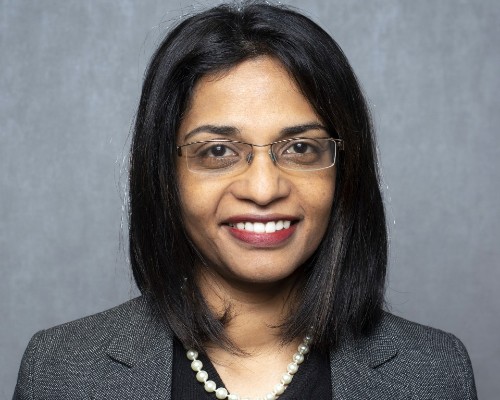
Kathreena Kurian, Professor of Neuropathology at the University of Bristol and the one of the report's lead authors.
A new landmark report, led by the University of Bristol researchers, highlights that access to genomic testing for patients with a brain tumour, is inequitable: it is estimated that fewer than 5% of eligible adult patients with a brain tumour are accessing certain tests.
The report, led by Tessa Jowell Brain Cancer Mission (TJBCM) and Bristol's Professor Kathreena Kurian, sets out the future of genomic testing based on a consensus from 41 professionals.
Each year, approximately 12,700 people in the UK are diagnosed with a brain tumour (1), and only 12% of adults diagnosed will survive more than five years (2). NHS England has singled out brain tumours as one of the few conditions eligible to benefit from fully commissioned whole genome sequencing (WGS), meaning that every adult patient in England with a brain tumour is eligible to receive this test (3). This is important, as sequencing can pick up "actionable" mutations and help identify patients who may benefit from clinical trials.
A team at the Tessa Jowell Brain Cancer Mission set out to explore the adoption and roll-out of WGS testing, to see if patients from different areas in the UK benefit from equitable access. The newly published report reveals that less than 5% of adult patients with a brain tumour were accessing WGS in 2023, with inequalities between different regions. The report sets out in detail why the number is so low, with challenges ranging from tests taking multiple months to complete, a high burden of paper work and limited knowledge around interpreting the extensive results.
Notably, the report also highlights that genomic testing is further behind in Scotland, Wales and Northern Ireland, when compared to England. The authors would like to work with policymakers in these nations to ensure their patients are not left behind.
A patient advocate said: "For patients, it is really challenging to understand that on the one hand, WGS is meant to be available for everyone, yet most are not able to access this. With the median survival time being 12 months, participating in sequencing and potential trial enrolment is something so many patients would like to get access to."
Encouragingly, the report notes that there are exceptions, with several hospitals making excellent progress in delivering their WGS service. Valuable lessons learnt from these centres have been distilled and are shared in the report. Local success was typically owed to strong clinical leadership and local access to relevant clinical trials which acted as a motivator to deliver the testing service.
Dr Nicky Huskens, TJBCM CEO said: "The ambition to give all patients with a brain tumour access to WGS is unique in Europe. While the initial findings were not what we were hoping to see, the trend in the last two years has been upwards, which is encouraging. With the help of the professionals involved, we have been able to precisely identify the pain points as well as a set of achievable recommendations. Once embedded, coupled with the motivated neuro-oncology workforce in the UK today, I believe the NHS can further cement its status as a world leader in genomic testing and precision medicine."
The report sets out a series of six community-backed actions to improve WGS adoption and unlock precision medicine opportunities for patients with a brain tumour in the UK. These will need to be adopted by the NHS, the charity sector and individual neuro-oncology centres. Recommendations include funding for additional neuro-oncology genomics coordinators to support the testing pathway, investment in genomics training and the establishment of a national 'Brain Tumour Precision Medicine Board', tasked with giving patients access to precision medicine initiatives. Importantly, the overall extra costs of these initiatives are estimated to be low.
For Professor Kathreena Kurian, a neuropathology professor and one of the lead authors of this report, increasing access to WGS testing is both a professional and a personal ambition. During the writing of this report, her husband Gerard was diagnosed with a recurrence of his brain tumour. Unlike most other patients, Gerard was able to access rapid WGS testing, which picked up a rare mutation. This enabled him to enrol onto a cutting-edge immunotherapy trial at The Royal Marsden, targeting his exact mutation. This gave their family hope and gave Gerard another year with good quality of life.
Kathreena Kurian, Professor of Neuropathology at the University of Bristol, said: "For me, this report contains bad news and good news. The bad news is that right now not every patient gets access or gets their results fast enough. The good news is that there are very clear recommendations, and with the right support we really can do better. My hopes are that every patient with a brain tumour in the UK will get access. It is very, very important, and I am very, very hopeful for the future."
The TJBCM is calling for a national effort from NHS leadership, NHS professionals, Genomics England, and brain cancer charities to jointly support the implementation of these recommendations, and the Mission stands ready to support.
Professor Richard Gilbertson, TJBCM Chair said: "The challenges highlighted in the report are not restricted to brain cancer. Thousands of patients with other cancer types could also benefit from genomic testing to guide their treatment and care. It is our hope that by streamlining genomic testing for brain tumours, we can generate learnings that will help patients with other conditions."
The full report can be read here.






